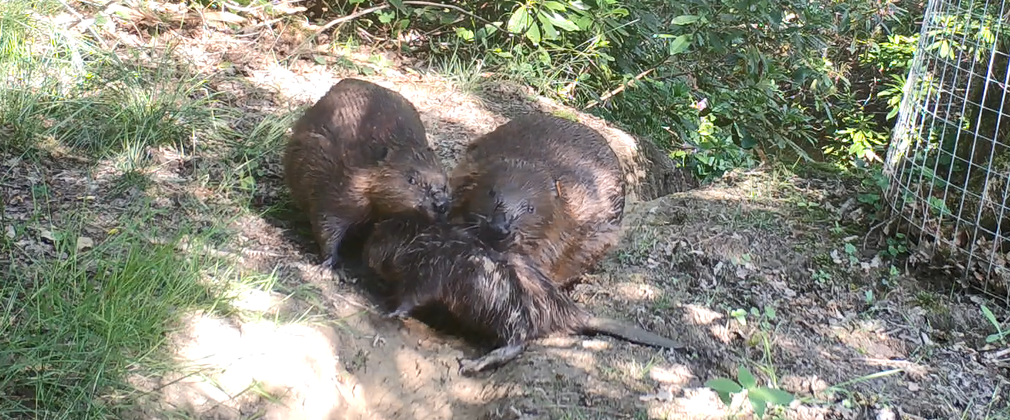
Baby beaver born in Cropton Forest, North Yorkshire
We are happy to announce a new addition to the beaver family at Cropton Forest, with the arrival of another healthy baby kit.
This brings the total number of youngsters on site to three, alongside the two adults initially introduced. The two kits born in May last year have both progressed very well, pulling their weight with various work tasks, and are now helping their parents take care of the new youngster.
Beavers are very family-orientated and kits stay with their group for at least two years. An assessment will then be made as to whether they stay on site as a large extended family group or are considered for moving to another project.
Cath Bashforth, Ecologist at Forestry England said:
The adult beavers settled in straight away after their release last year, quickly making the site their home. I am really pleased that they have had another kit this year and that all the whole family look so fit and well.
It is delightful to see the strong family bond on the footage from the trail cameras, with last year’s offspring helping with the new arrival. I look forward to watching the kit grow and learn from its siblings over the next few months. It will be fascinating to watch them work together as a family to further change the site with new dams and channels, reconnecting the river with its floodplain.
Alan Eves, Forest Management Director at Forestry England said:
We introduced the adult pair to the 10-hectare enclosure in Cropton Forest on the North York Moors back in April 2019 as a five-year Forestry England trial to measure their impact on flood management in association with the Slowing the Flow project. This is the third kit to be born since the start of the project and we are delighted that the family have settled in so well.
We have been working in partnership with many organisations and individuals to study how they affect the landscape and whether their actions can help reduce flooding. The objective is to monitor whether their activity has a positive impact on maintaining the artificial wooden dams in the area and boosting biodiversity.
Notes to Editor
1. Forestry England manages and cares for the nation’s 1,500 woods and forests, with over 230 million visits per year. As England’s largest land manager, we shape landscapes and are enhancing forests for people to enjoy, wildlife to flourish and businesses to grow. For more information visit forestryengland.uk. Forestry England is an agency of the Forestry Commission.
2. The Cropton Forest enclosed beaver trial is a continuation of the 'Slowing the Flow' project to reduce flooding in the area. The beaver trial is led and managed by Forestry England in partnership with local organisations, individuals and volunteers.
The two original adult beavers sourced from Scotland were released in April 2019 into a secure area as part of a five-year trial.
The beavers are monitored closely with trail cameras throughout the enclosure to capture footage of behaviour and to monitor their health and wellbeing. The cameras have picked up some incredible footage of the beavers at work and play, along with a wide range of other wildlife.
The communities downstream from Cropton Forest have suffered severe flooding in the last twenty years, with the most serious flood in 2007 causing approximately £7 million in damage to homes and businesses. Man-made dams are already helping to reduce flooding, however they are expensive and time-consuming to look after.
The main aim of the trial is to monitor the way that the beavers interact with the man-made woody structures in the beck – to see if they will adopt and maintain them on our behalf. There is one large timber bund in the site and three smaller man-made dams. The idea is that they will maintain existing dams and create their own, helping to prevent possible flooding further downstream.
It is too early to assess the exact impact the beavers have had on the flow of the beck but we already know that the movement of water through the site has been significantly altered. To achieve this, the beavers have coppiced trees, helped raised water levels of a pond – by blocking the outflow channel – and have constructed a canal to link two ponds.
More information visit Beaver trial at Cropton Forest
Photo/video credit: ©Forestry England
Media Contact:
Laleh Hobbs, Communications and Marketing Manager
e: laleh.hobbs@forestryengland.uk
t: 0300 067 4333
